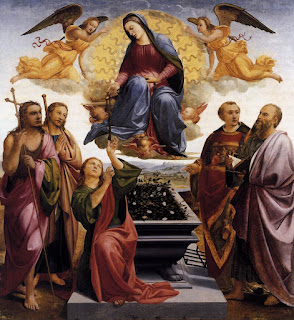 A Blessed Life
A Blessed Life
It will be no surprise that those for whom the bible is paramount, for whom nothing can be said without clear biblical justification, the doctrine of the Assumption is not something they are easy with. We use the gospel reading on the Visitation, because there is nothing in the gospels that describes the Assumption in the way that the Visitation is described. Elsewhere, Psalm 132, where the Blessed Virgin is interpreted as the “Ark of God” that is taken into heaven, is cited. Along with similar interpretations of Genesis 3:15, 1 Corinthians 15:54, and Revelation 12:1-2, this hardly amounts to an explicit expression of the dogma of the Assumption; on their own, they are not a ringing endorsement. So, why is this gospel passage selected for today? How do we draw a trajectory from the Visitation to that of the Assumption?
In today’s account of the Visitation of our Lady to her cousin St Elizabeth, we see the exploding synergy which takes place during the meeting of these two women and the unborn children within their wombs. St Luke was determined to let us know that Mary “went as quickly as she could”, spurred on by a double motivation; to share the joy of Elizabeth’s good fortune in having conceived a son when well beyond the age of childbearing, and secondly, to share her own heavenly secret that she was to be the mother of the Messiah.
But apart from the excitement, the energy and the joy displayed by the various characters in today’s gospel including the unborn St John the Baptist, in the womb of St Elizabeth who leapt for joy as he heard Mary’s greeting, we see a remarkable theme being weaved through the entire narrative from beginning to end - it is the blessed life. Mary is living the blessed life.
In today's gospel, we have a description of the blessed life of the Virgin Mary. St Elizabeth honours her with this praise that she is the “most blessed” among all women; that the child within her womb is “blessed,” and Mary breaks into song acknowledging this blessedness: “all generations will call me blessed.” She acknowledges the source of that blessedness - it is God, “holy is His name.”
As some people are fond of saying that they are “living the dream,” which is to say that they have achieved their lives’ goals and their ideals and dreams have become reality, Mary is living the blessed life, not some unfulfilled dream in the future but a present reality.
What does it mean to live a blessed life? The simplest answer is that, it means to live in God’s presence. This is captured so beautifully in the first paragraph of the Catechism of the Catholic Church:
“God, infinitely perfect and blessed in himself, in a plan of sheer goodness freely created man to make him share in his own blessed life. For this reason, at every time and in every place, God draws close to man. He calls man to seek him, to know Him, to love Him with all His strength. He calls together all men, scattered and divided by sin, into the unity of his family, the Church. To accomplish this, when the fullness of time had come, God sent His Son as Redeemer and Saviour. In his Son and through Him, He invites men to become, in the Holy Spirit, His adopted children and thus heirs of His blessed life.”
This is why we call the Saints blessed, because they are heirs of God’s blessed life - having reached Heaven, they stand in God’s presence enjoying beatific vision—seeing God face to face. The Blessed Virgin Mary, though counted among the company of Saints, is uniquely privileged. She did not need to wait for death, as in the case of the other Saints, to experience this grace-filled moment of sanctification. Our Church holds this belief, based on scripture and tradition, that she was preserved from original sin from the moment of conception in her mother St Anne’s womb, and she alone among all mortals, was free from personal sin throughout her entire life.
The Blessed Virgin Mary shows us the manner in which we can live the blessed life in the here and now. By her dedication to God, she was open to doing His will. She opened her heart so that the Holy Spirit was able to dwell in her and the Word of God, the second person of the Most Holy Trinity, could take flesh in her womb. Mary wasn’t just some incidental insignificant supporting character in the story of salvation, nor a mere hollow receptacle of the Divine Being. It is from her flesh that God took on human flesh to become man. God became man through her and not in spite of her. God now shares in our humanity because of her.
The Blessed Virgin Mary is without a doubt the epitome of the blessed life to which the Assumption is an appropriate end, and perhaps the only logical conclusion. It makes sense, that she should be assumed into heaven, as a representative of humanity. Our Lady was born without sin, and was perfect in virtue. It is only proper then, that at the end of her earthly life, that she should be raised to heaven, to share in her Son's victory: an assumption that is on offer to the entire human race. Our Lord Jesus Christ tells us that He has gone to prepare a place for us. Surely, it is right to believe that the Blessed Virgin already enjoys a privilege spot in that place.
We too are invited to have a share in this blessed life, for God has promised that He will “exalt the lowly.” If we imitate our Blessed Mother in her humility, we will also share in the privilege accorded to her in glory. As our Lord welcomed His own mother into His eternal presence, He too beckons us, waving us over, inviting us to take our place at the table of the heavenly banquet which He has prepared for us, and where our Lady sits on His right as she whispers this piece of maternal advice into our ears: “do what ever He tells you to do,” and continues to intercede for us that “we may merit to be exalted by (Christ) on high.”

